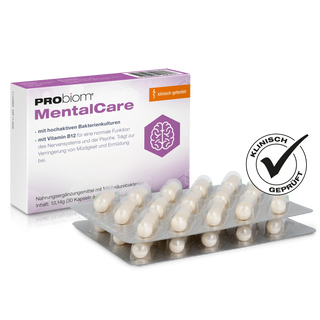Good sleep is essential for our health, yet many people suffer from sleep disorders. Causes can be stress, poor sleeping habits, or health problems. In recent years, research has increasingly shown that our microbiome—the totality of microorganisms in our gut—also plays an important role in our sleep. But how exactly does the gut flora influence our sleep, and what can we do to avoid sleep disorders?
What are sleep disorders?
Sleep disorders are widespread and can manifest themselves in various forms:
-
Difficulty falling asleep : difficulty relaxing and falling asleep in the evening.
-
Sleep disturbances : Frequent waking up during the night with difficulty falling asleep again.
-
Early awakening : Waking up in the early morning hours without being able to go back to sleep.
-
Non-restorative sleep : Feeling tired despite getting enough sleep.
Long-term sleep problems can lead to serious health consequences, including difficulty concentrating, a weakened immune system, weight gain, and an increased risk of cardiovascular disease.
Causes of sleep disorders
Sleep problems can be caused by various factors, including:
-
Stress and psychological strain : Anxiety, worry and stress hormones such as cortisol can affect sleep.
-
Poor sleep hygiene : Irregular sleep times, screen light in the evening or caffeine consumption disrupt the sleep-wake rhythm.
-
Hormonal fluctuations : Changes in hormone levels, especially melatonin and serotonin, affect sleep quality.
-
Unhealthy diet : Heavy meals before bedtime or a nutritional deficiency can negatively affect sleep.
-
Medical causes : Conditions such as sleep apnea, depression or thyroid problems can contribute to sleep disorders.
The importance of the microbiome for sleep
Research increasingly shows that our gut and its microorganisms are closely linked to our sleep behavior. The microbiome influences the production of neurotransmitters, hormones, and inflammatory processes necessary for healthy sleep.
-
Serotonin and melatonin production
-
The gut produces around 90% of the body's serotonin, which serves as a precursor to the sleep hormone melatonin. An imbalance in the gut flora can lead to reduced production of this important sleep regulator.
-
-
Influence on the nervous system
-
The microbiome communicates with the brain via the so-called gut-brain axis. A healthy gut flora can reduce stress and promote relaxation.
-
-
Inflammatory processes and sleep quality
-
Disturbed intestinal flora can lead to chronic inflammation, which is linked to sleep problems. Inflammatory markers such as interleukin-6 are often elevated in people with sleep disorders.
-
-
Influence on cortisol levels
-
An unbalanced microbiome can increase cortisol levels, making it difficult to fall asleep and leading to nighttime awakenings.
-
How can you support the microbiome to improve sleep?
-
Consume probiotics and prebiotics
-
Probiotic foods such as yogurt, kefir and fermented vegetables support a healthy intestinal flora.
-
Prebiotic fiber from oats, bananas, chicory and onions promotes the growth of good intestinal bacteria.
-
-
Maintain a gut-friendly diet
-
A balanced diet with plenty of vegetables, whole grains and healthy fats promotes the microbiome.
-
Sugar, highly processed foods and artificial additives should be reduced as they can negatively affect the intestinal flora.
-
-
Reduce stress
-
Meditation, yoga or breathing exercises can reduce stress hormones and benefit both the gut and sleep.
-
-
Regular exercise
-
Sport and exercise improve intestinal health and help improve sleep quality.
-
-
Optimize sleep hygiene
-
A dark, cool and quiet sleeping environment creates optimal conditions for a restful night.
-
A regular sleep rhythm regulates the natural biorhythm.
-
Conclusion
Sleep disorders are a widespread problem that can be caused by various factors. Recent research shows that the microbiome plays a crucial role in regulating sleep processes. A healthy diet, the targeted consumption of probiotics, and conscious stress reduction can positively influence the microbiome – and thus also the quality of sleep. Anyone who regularly suffers from sleep problems should, in addition to traditional sleep hygiene measures, also keep an eye on their gut health.













